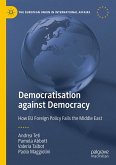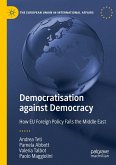This book provides a new theory for how democracy can materialize in the Middle East, and the broader Muslim world. It shows that one pathway to democratization lays not in resolving important, but often irreconcilable, debates about the role of religion in politics. Rather, it requires that Islamists and their secular opponents focus on the concerns of pragmatic survival-that is, compromise through pacting, rather than battling through difficult philosophical issues about faith. This is the only book-length treatment of this topic, and one that aims to redefine the boundaries of an urgent problem that continues to haunt struggles for democracy in the aftermath of the Arab Spring.
"Alaoui's book stands out as a major contribution to MENA regional studies, comparative politics, democratisation studies, and the study of religion and politics more broadly. ... His book will be of broad interest to scholars, students, policymakers, and also hopefully those in the region who might someday contribute to shaping a future of greater freedom for MENA's large population of young people." (Mieczyslaw P. Boduszynski, The Journal of North African Studies, May 30, 2023)








